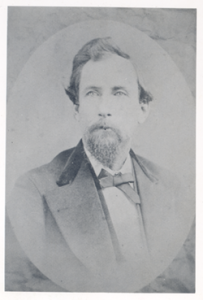The Davidson College Archives houses the collected papers of a number of noted alumni and faculty. Among these collections is the “W. E. Ardrey Papers.” The Ardrey Papers collection includes biographical information, diaries, petitions, and account ledgers spanning the years 1861 to 1907. Several of the diaries have been transcribed by Ardrey’s descendants, and those hand typed transcriptions have recently been digitized and made available online in a William Erskine Ardrey digital collection. We are also working on transcribing Ardrey’s other diaries and papers, or more accurately we are asking you to help transcribe them through our online transcription project. The project allows any one anywhere in the world with an interest in transcribing Civil War era manuscripts to access materials online and electronically submit their transcriptions through our Community Space website.
William Erskine Ardrey was born in the Lower Providence area of Mecklenburg County on September 23, 1839 to Dr. William Alexander Ardrey and Lydia Lavinia Potts Ardrey. He was raised on his father’s plantation, called “Forest Home,” and attended the Providence Academy. Ardrey entered Davidson College in 1858, but left the college in 1861, before completing his degree, to fight for the Confederacy in the Civil War.
Ardrey’s first enlistment was with Company C of the “Charlotte Grays” of the 1st North Carolina Regiment (General D. H. Hill, commander). In June of 1861, after the Battle of Big Bethel, Ardrey’s Company joined the Confederate Army, where he served as a private for six months. After his service with the Charlotte Grays, Ardrey enlisted, again as a private, in Company K of the 30th North Carolina Infantry Regiment. The Regiment was ultimately assigned to serve in General G.B. Anderson’s, Ramseur’s, and Cox’s Brigade in the Army of Northern Virginia. The 30th fought in a number of battles, including Seven Pines, Fredericksburg, Rappahannock River, Chancellorsville, Cold Harbor, Mechanicsville (where Ardrey was wounded), and Gettysburg, and marched with General Jubal Early to the Shenandoah Valley. The 30th was also at Appomattox at the time of General Lee’s surrender on April 9, 1865. During his service with the 30th Regiment, Ardrey was gradually promoted to the rank of captain and placed in command of Company K.
On January 31, 1865, as the war raged on, Ardrey married his first wife, Mary Margaret Robinson, in Sharon Township, Mecklenburg County. They had four children: James P. Ardrey, William M. Ardrey, Dr. Lucius L. Ardrey, and Mrs. Ida Lydia Ardrey Crowell, all of whom were still living at the time of Ardrey’s death in 1907. Mary Margaret Ardrey died in 1879.
After the death of his first wife in 1879, Ardrey remarried, wedding Mary Elizabeth Howie on July 22, 1880. Their union produced five children who were alive at the time of Ardrey’s death in 1907: Mrs. Emma Ardrey Spratt, Mrs. Alice D. Ardrey Stough, Mrs. Annie Rone Ardrey Tuttle, Robert Holt Ardrey, and Erskine Ardrey.
In addition to earing his living as a planter after the Civil War, Captain Ardrey, as he was commonly referred to, was active in the political and civic life of Mecklenburg County and the state of North Carolina. He organized the Carolina Academy in Providence Township, Mecklenburg Co. in 1872 and taught at the school for several years. In 1874, Ardrey was elected Chairman of the Mecklenburg County Board of Commissioners and served in that role for ten years. In 1876, Ardrey was also elected as a member of the House for the first post-Civil War Democratic Legislature of North Carolina. He served as a legislator in the North Carolina State House in 1879, 1885, and 1901, and served a term as a North Carolina State Senator in 1891. From 1892-1896, Ardrey was appointed by President Grover Cleveland to serve as Superintendent of the Assay Office of the United States Mint in Charlotte, NC.
Ardrey also served for 40 years as superintendent of the Sunday school at the Harrison Methodist Church, of which he was a member since the age of 15 and at which he was buried after his death on May 20, 1907.


Speak Your Mind